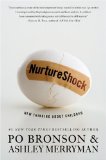Parents and Caregivers, We are thrilled to unveil our latest initiative – Head to Heart…
Nurture Shock: Chapter 6 – The Sibling Effect

We’re reading Nurture Shock this summer and I’m also sharing my favorite recipes. This week’s topic is Sibling Rivalry. I’m behind my self-imposed schedule of reading and blogging about one chapter a week. First reason is the glorious weather we’re having in the Pacific Northwest. There really is no place I’d rather be in the summer. The second reason is cat-related – we had to put one of our 3 cats to sleep over the weekend and that has taken the wind out of my sails. Curiously her passing has reduced the sibling rivalry between the other two cats – at least for now! And the rivalry between my two daughters over this cat is legendary!!
Having lived with some of the most contentious sibling rivalry I’ve ever known I wasn’t too surprised by the research cited in this chapter. I did find the information on social skills interesting. Here the assumption was that children with siblings would be ‘massively more skilled at getting along than children with no siblings’ – they aren’t, and in fact the opposite may even be true – children learn poor social skills from those interactions just as often as they learn good ones.
But I love this stat – siblings between the ages of three and seven clash 3.5 times per hour, on average. Some of those are brief clashes, others longer, but it adds up to ten minutes of every hour spent arguing. That was my life. We lived by the clock. If the two younger ones were together longer than 30 minutes it was disaster. We practiced all kinds of mediation, but my favorite to this day was,”That makes me feel uncomfortable”. In a moment of desperation I came up with that phrase and for at least a year, maybe longer, whenever one of the children felt wronged they would say it to their sibling. This was when they were 2, 3 and 6. One of my most precious memories is hearing my 2 year old (who had a speech delay) say ‘At makes me un-umtable‘. And it worked. It gave them pause and as soon as I heard it I knew the situation had gotten to an escalated point of no return. Sometimes an adult did not have to step in but most of the time one of us did and that was our chance to process the event.
We were relentless in trying to change the quality of their interactions. We tried to control the amount of time they spent together; limit the types of toys; change out the toys by putting the offending toys away. And then there were balloons – the fast track to fights. I drew the line on balloons. I apologize to Mother Earth but if a balloon crossed our threshold it created pure chaos. If balloons came home from a party or the pizza restaurant, they had to stay outside! We read all the books about sibling rivalry, saw therapists, and spent most of our time running interference. It was exhausting.
Neither of us had had much experience with sibling rivalry. Our own siblings were either much older or younger and we felt ill prepared for this experience. Now that they are all young adults I can see there were some benefits to their constant bickering – they know how to work things out between themselves. They are amazing communicators, negotiators and mediators. But according to the authors sibling relationships and parents don’t influence future relationships as well as the relationship with your best friend. Interesting – those play-dates are important after all! According to the authors ‘getting what you need from your friends is what forces a child to develop skills’. Geez, if I’d known that I wouldn’t have spent so much time trying to help them get along! What was your experience with your siblings? And what is your experience now raising your children?
Next Week: The Science of Teen Rebellion
This Week’s Recipe – Salmon with Dijon Basil Butter
3 Tablespoons butter, melted
1 Tablespoon Dijon mustard
1/4 cup fresh basil (loosely packed), thinly sliced
1 (1 1/2 to 2 pounds) salmon fillet, skin on
Salt and freshly ground black pepper
Stir together butter, mustard and basil. Place salmon on a double layer of foil and season with salt and pepper. Pour butter over salmon. Heat grill to medium-high. Place salmon on grill and close lid. Grill for 7-12 minutes (depending on thickness of salmon), or until just cooked through. Alternately, bake at 450 degrees F. Serve hot. Serves 4

Comments (0)